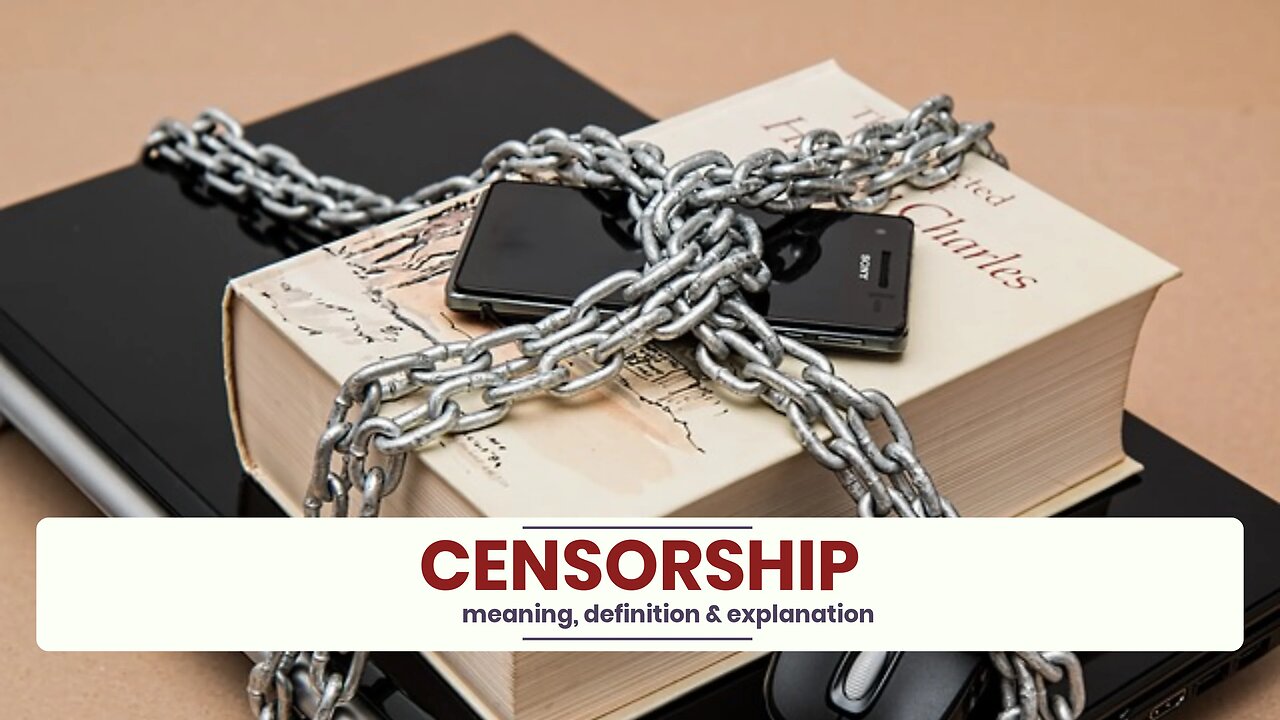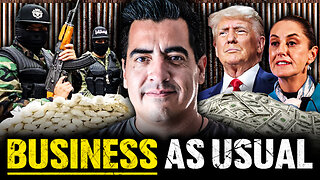Premium Only Content

What is CENSORSHIP?
✪✪✪✪✪
http://www.theaudiopedia.com
✪✪✪✪✪
What does CENSORSHIP mean? CENSORSHIP meaning - CENSORSHIP definition - CENSORSHIP explanation. What is the meaning of CENSORSHIP? What is the definition of CENSORSHIP? What does CENSORSHIP stand for? What is CENSORSHIP meaning? What is CENSORSHIP definition?
Censorship is the suppression of free speech, public communication or other information which may be considered objectionable, harmful, sensitive, politically incorrect or inconvenient as determined by governments, media outlets, authorities or other groups or institutions.
Governments, private organizations and individuals may engage in censorship. When an individual such as an author or other creator engages in censorship of their own works or speech, it is referred to as self-censorship. Censorship could be direct or indirect, in which case it is referred to as soft censorship. It occurs in a variety of different media, including speech, books, music, films, and other arts, the press, radio, television, and the Internet for a variety of claimed reasons including national security, to control obscenity, child pornography, and hate speech, to protect children or other vulnerable groups, to promote or restrict political or religious views, and to prevent slander and libel.
Direct censorship may or may not be legal, depending on the type, location, and content. Many countries provide strong protections against censorship by law, but none of these protections are absolute and frequently a claim of necessity to balance conflicting rights is made, in order to determine what could and could not be censored. There are no laws against self-censorship.
The rationale for censorship is different for various types of information censored:
- Moral censorship is the removal of materials that are obscene or otherwise considered morally questionable. Pornography, for example, is often censored under this rationale, especially child pornography, which is illegal and censored in most jurisdictions in the world. Moral censorship in the United States grew out of anti-obscenity movements in the years after the Civil War. Efforts to thwart obscene materials in some instances became federal law, and in even more so in the form of stricter state laws. Private organizations were formed to target those who produced and traded obscene materials and worked to send violators to prison in numbers. The U.S. Post Office was also used as a tool in enforcement, looking for obscene materials in the mail.
- Military censorship is the process of keeping military intelligence and tactics confidential and away from the enemy. This is used to counter espionage, which is the process of gleaning military information.
- Political censorship occurs when governments hold back information from their citizens. This is often done to exert control over the populace and prevent free expression that might foment rebellion.
- Religious censorship is the means by which any material considered objectionable by a certain religion is removed. This often involves a dominant religion forcing limitations on less prevalent ones. Alternatively, one religion may shun the works of another when they believe the content is not appropriate for their religion.
- Corporate censorship is the process by which editors in corporate media outlets intervene to disrupt the publishing of information that portrays their business or business partners in a negative light, or intervene to prevent alternate offers from reaching public exposure.
Censorship has been criticized throughout history for being unfair and hindering progress. In a 1997 essay on Internet censorship, social commentator Michael Landier claims that censorship is counterproductive as it prevents the censored topic from being discussed. Landier expands his argument by claiming that those who impose censorship must consider what they censor to be true, as individuals believing themselves to be correct would welcome the opportunity to disprove those with opposing views.
Censorship is often used to impose moral values on society, as in the censorship of material considered obscene. English novelist E. M. Forster was a staunch opponent of censoring material on the grounds that it was obscene or immoral, raising the issue of moral subjectivity and the constant changing of moral values. When the novel Lady Chatterley's Lover was put on trial in 1960, Forster wrote:
‘Lady Chatterley’s Lover is a literary work of importance...I do not think that it could be held obscene, but am in a difficulty here, for the reason that I have never been able to follow the legal definition of obscenity.
-
 1:52
1:52
The Audiopedia
9 months agoWhat is EXECUTIVE DIRECTOR?
531 -
 14:38
14:38
Exploring With Nug
1 day ago $30.95 earnedWe Found the Secret That This Lake Has Been Hiding For Decades!
92.7K11 -
 9:20:53
9:20:53
SpartanTheDogg
17 hours agoPro Halo Player
37.2K3 -
 23:23
23:23
MYLUNCHBREAK CHANNEL PAGE
1 day agoAustralia Was Found
89.4K81 -
 1:41:45
1:41:45
The Connect: With Johnny Mitchell
18 hours ago $17.13 earnedMexican Cartels Are Moving MORE Drugs Than Ever, Going To WAR On The Government (Emergency Update)
53.3K10 -
 6:54:01
6:54:01
MissesMaam
13 hours agoFinishin' Red Dead Redemption 💚✨
84.5K8 -
 34:44
34:44
LFA TV
5 days agoMIRACLES DO HAPPEN!
90.8K1 -
 5:26:31
5:26:31
GamersErr0r
9 hours ago $5.24 earnedMooning My Community
53.2K1 -
 2:22:59
2:22:59
Banks Atkin Live
12 hours agoChilling playing Games & Vibin
76.3K1 -
 8:08:50
8:08:50
Dragoon_B
13 hours agoNothing crazy - just Counter Strike + Valorant
35.2K2